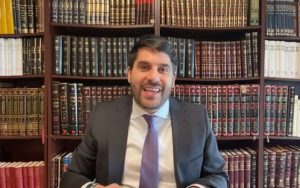Shimon ben Lakish, better known as “Reish Lakish,” is one of the more fascinating personalities in the Talmud. He began his career as a gang leader, robbing and pillaging at will. At one point, he even worked as a gladiator.
Later on in life, he became a great rabbi and the study partner of the famed Rabbi Yochanan.
Reish Lakish is also responsible for arguably the most provocative statement on teshuva (repentance) in the Talmud: one who performs teshuva from love transforms intentional sins into merits.
This is so radical!
We have all heard of starting with a new slate after Yom Kippur, but having our teshuva actually elevate our sins to count as merits? This is truly a novel approach!
How does all of this work?
Rabbi Abraham Isaac Kook has a wonderful teaching on this which is instructive for us as we now prepare to enter Yamim Noraim, the Days of Awe:
When one engages in teshuva, one must … define the good which is present in the depths of the sin and strengthen it. … By means of [strengthening the good within the sin], teshuva … transforms sins into merits.
Every sin contains within it both positive and negative aspects. We must make sure that our remorse only be applied to the latter. Once we clearly define the positive aspects within sin, we must proceed to strengthen them.
This, Rabbi Kook shares, is what transforms sins into merits.
Allow me to elucidate by means of an example from none other than the life of Reish Lakish, the author of the revolutionary sin-to-merit lesson.
As mentioned, Reish Lakish was a strong man. While head of his clan, he misused his strength through inflicting pain on others and taking advantage of them.
The Talmud shares that when Rabbi Yochanan finally helped him repent, Reish Lakish immediately became weak and lost his power (Baba Metzia 84a).
I understand this to mean that he was so serious about distancing himself from his sinful past that he divorced himself altogether from his G-d-given talent, which was his strength. It got him into so much trouble in the past that it simply wasn’t worth making space for it in his newly religious present.
Later on, he realized that this was not sustainable and shifted to channeling it toward good. As the story goes, one day Rav Imi was kidnapped. After considering every rescue option, Rabbi Yochanan finally gave up hope.
Upon hearing this, Reish Lakish stood up and announced, “I will use my strength to save him!”
And he did. He negotiated his release and liberated Rav Imi.
This is what it means to transform sins into merits: to actively seek out the good within our negative behavior and use it to improve the world. In Reish Lakish’s case, he embraced his strength and used it to save Rav Imi.
In our daily lives, we can do the same. We must not abandon our “negative” traits altogether. For instance, anger can be channeled to fight against injustice; pride can serve us in standing up for ourselves.
Even lashon ha-ra, evil speech, can be good at times: for instance, when used to protect a friend from a negative influence.
During Rosh Hashanah and Yom Kippur, we undergo profound remorse while confessing our misdeeds in the Vidui (confession) prayer. This is how it should be. We all need a stretch of time each year to soul-search and hit the restart button.
Reish Lakish is reminding us that during this process, keep in mind teshuva from love as well: where one loves and embraces all of their positive qualities — incorporating them in the service of Hashem.
When we do so, we not only confront our troubled past, we use it to build a brighter future.

Rabbi Dr. Eli Yoggev is a spiritual leader at Pikesville’s Beth Tfiloh Congregation.





